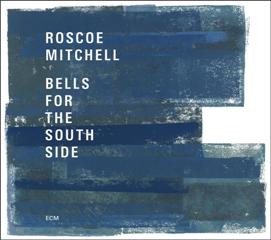Roscoe Mitchell - Bells for the South Side (2017)
Roscoe Mitchell - Bells for the South Side (2017)

1-1 Spatial Aspects Of The Sound 12:14 1-2 Panoply 7:37 1-3 Prelude To A Rose 12:45 1-4 Dancing In The Canyon 10:24 1-5 EP 7849 8:14 1-6 Bells For The South Side 12:36 2-1 Prelude To The Card Game, Cards For Drums, And The Final Hand 16:03 2-2 The Last Chord 12:27 2-3 Six Gongs And Two Woodblocks 7:50 2-4 R509A Twenty B 1:34 2-5 Red Moon In The Sky / Odwalla 25:49 Roscoe Mitchell - sopranino, soprano, alto and bass saxophones, flute, piccolo, bass recorder, percussion James Fei - sopranino and alto saxophones, contra-alto clarinet, electronics Hugh Ragin - trumpet, piccolo trumpet Tyshawn Sorey - trombone, piano, drums, percussion Craig Taborn - piano, organ, electronics Jaribu Shahid - double bass, bass guitar, percussion Tani Tabbal - drums, percussion Kikanju Baku - drums, percussion William Winant - percussion, tubular bells, glockenspiel, vibraphone, marimba, roto toms, cymbals, bass drum, woodblocks, timpani
For more than 50 years, Roscoe Mitchell has blurred relationships between sound and silence, scripted composition and improvisation, jazz, classical, and even R&B musics as a soloist, bandleader, member of the Art Ensemble of Chicago, and composer. In 2015, Chicago's Museum of Contemporary Art presented a 50th anniversary exhibition devoted to the Association for Advancement of Creative Musicians (or AACM), an organization Mitchell co-founded, in an exhibit called The Freedom Principle. The music on the double-length Bells for the South Side was recorded during the exhibit with four of Mitchell's trios -- James Fei and William Winant; Hugh Ragin and Tyshawn Sorey; Craig Taborn and Kikanju Baku; Jaribu Shahid and Tani Tabbal -- playing separately and in combinations.
The music here glances back to the many places Mitchell has visited, but this is no mere retrospective: most of this is bracing new music that looks forward to further exploratory musical landscapes. The set opens with "Spatial Aspects of the Sound," a chamber piece with Baku using wrist bells, Winant's various percussion instruments, and Taborn's and Sorey's pianos. At 12-plus minutes, it unhurriedly allows tones and clusters, movement and stillness, to articulate a range of carefully controlled articulations. On "Panoply," sputtering sopranino, squawking tenor, kit drums, and various percussion instruments engage in aggressive, inspired free interplay. "Prelude to a Rose" contrasts Sorey's trombone, Ragin's trumpets, and Mitchell's reeds in elongated, dovetailing tones through a slowly unfolding melody. "EP 7849" is another combinatory exercise with electronics, electric guitar, cowbell, hand drums, and bowed double bass that offers futurist dissonance and complex, fascinating engagement. "Dancing in the Canyon" is a canny, propulsive, and extremely active free-for-all with Taborn and Baku. On the title track, disc one's closer, the Art Ensemble's army of percussion instruments is utilized. Sorey plays Mitchell’s percussion cage, and Tabbal and Baku the percussion instruments of Don Moye and Malachi Favors, with Winant on Lester Bowie's bass drum. Ragin’s trumpet offers sounds in all registers, while Mitchell digs extremely low-end sounds from his bass sax. It's certainly mysterious, but also utterly lovely. Disc two's "Prelude to the Card Game, Cards for Drums, and the Final Hand" features Mitchell, Tabbal, and Shahid in an intuitive, equaniminous improvisation one would expect from players whose relationship dates back 40 years. Likewise, the extended smearing and droning of Mitchell's and Fei's reeds on "Six Gongs and Two Woodblocks" amid Winant's percussion and Fei's electronics are simultaneously spectral and inquisitive. The closing medley, "Red Moon in the Sky/Odwalla," juxtaposes a new work (the former) with a reading of an Art Ensemble staple, with all players in open, bleating improvisation before a tight, bluesy, modal post-bop sums it all up, displaying the myriad faces of Mitchell's approach to both function and extension in the relentless creation of a poetics in sound. Bells for the South Side is indeed massive, but its depth, breadth, and inspired performances border on the profound. ---Thom Jurek, AllMusic Review
Roscoe Mitchell zestawia ze sobą swoje cztery charakterystyczne tria i po raz pierwszy łączy ich brzmienia. Owocem tego przedsięwzięcia jest porywający podwójny album, zarejestrowany w Muzeum Sztuki Współczesnej w Chicago.
Mitchell – multiinstrumentalista i kompozytor został zaproszony do zaprezentowania swojej nowej muzyki w ramach wystawy The Freedom Principle (Zasada Wolności), zorganizowanej dla uczczenia nowych kierunków w sztuce i muzyce, wyznaczonych przez chicagowską organizację Association for the Advancement of Creative Musicians (AACM – Stowarzyszenie na rzecz Rozwoju Muzyków Kreatywnych).
Rozpoczynając badaniem “Przestrzennych Aspektów Dźwięku”, w którym udział wzięło trio z Craigiem Tabornem i Tyshawnem Soreyem w składzie (obaj na fortepianie), Mitchell szkicuje coś w rodzaju swojego autoportretu na tle nieustannie zmieniających się kolorów i tekstur.
Dwa utwory – w tym tytułowy – wykorzystują bogate instrumentarium perkusyjne Art Ensemble of Chicago, dzięki czemu słuchacz może rozkoszować się swoistą panoramą gongów, dzwonków, kołatek, syren, czy bębenków. Każdy z muzyków, który wziął udział w nagraniu tego albumu, daje od siebie coś wyjątkowego. Przykłady można mnożyć: piękna, liryczna partia gitary basowej Jaribu Shahida w utworze “EP 7849”, chwytające za serce solo w “Cards for Drums” w wykonaniu Taniego Tabbala, partia trąbki Hugh Ragina w “Bells for the South Side”, czy klimatyczna elektronika Craiga Taborna i Jamesa Fei w “Red Moon in the Sky”.
Całość spajają partie saksofonowe Mitchella - od szczebioczącego saksofonu sopranowego, po potężny basowy. Ostatnim utworem na krążku jest “Odwalla”, którą Mitchell skomponował z dedykacją dla Art Ensemble. --- wsm.serpent.pl
download (mp3 @320 kbs):
yandex 4shared mega mediafire uloz.to cloudmailru








